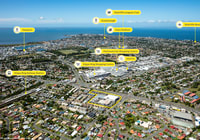
A coworking space with the right mix of tenants can help a small business grow
When Roux Visser launched his IT startup five months ago, he took a keen look around for a suitable coworking office location.
But while he wanted to be somewhere central in Melbourne, which could offer him plenty of space flexibility as his business expanded, or contracted, the most important factor was the company he’d be keeping. For today, relationships at coworking spaces are king.
“We didn’t want to be in a coworking space with lots of tech startups,” said Mr Visser, the founder of the data infrastructure and application management firm The Migration Company. “Because one of the benefits of coworking is the opportunity to find customers in the same building.
“And as it happens, one of my largest customers was a referral from one of the businesses we share an office with, which was obviously a great bonus. As well, we’ve also managed to collaborate with other organisations with an exchange of services – we’ll do something for you, and you’ll do something for us.”
That’s perhaps just one of the reasons that, after such a short time in business and working from shared space run by Victory Offices at 333 Collins Street, Mr Visser has gone from being the sole member of his company to having 32 employees.
He’s now thinking of starting another company, this time focused on blockchain, that could, if his finance comes through, see him seeking space for an additional 100 workers.
For Dan Baxter, the chief executive of flexible office provider Victory Offices, it’s those kind of success stories that have spurred him on to champion the networking opportunities within his shared spaces. He’s now even starting his own incubator program to formalise networking opportunities.
“We’re undertaking it because we want to help startups as a way of supporting the community, and as part of our corporate social responsibility agenda,” said Mr Baxter, while celebrating Victory Offices’s own success in being named the second-fastest growing Australian company in the Australian Financial Review’s Fast 100 List.
“If people have the guts to start their own businesses, then it’s important they get the right support and systems in place – and we don’t like to see them fail because maybe they don’t have a mentor or the right exposure or expertise. So we’ve put $150,000 into starting our own incubator program.”
Melbourne-based startups are being invited to apply – up until the closing date of January 18 2019 – for the chance to take part, and receive three months’ free cosharing space, networking opportunities, invitations to functions, one-on-one business strategy coaching and mentoring.
“We love to help new ventures grow and succeed, and I truly believe that supporting business development is a central plank of coworking,” Mr Baxter said.
Developer Mirvac is another company intent on fostering relationships among startups as a way of nurturing their business models and helping them to succeed.
They’re now opening a second Sydney location for Hoist, an independent private company that brings startups and corporates together in a curated coworking environment to foster their growth.
A pilot program in Eveleigh worked so well, it’s now expanding to a premises at 80 Bay Street, Ultimo. One of their first customers was Evergen, an energy services company that sells and manages intelligent home energy systems.
Evergen chief executive Emlyn Keane chose the space initially because it offered great flexibility if his company’s numbers went up or down, without a huge outlay on real estate, and it was a beautiful place to work – with an excellent coffee machine.
“But we’ve found being with a whole bunch of other businesses means we’ve been able to share opportunities and decisions, talk about challenges and even share resources,” he said.
“We make small electronic boxes that plug into the solar batteries that uses AI to optimise energy use, and we manufacture those in the space too. We’ve even been sharing tools with other companies making other things. The culture Hoist has created is really open and encourages you to talk to other people and share business opportunities.”
Two ‘community managers’ work to bring people together and talk about what they’re doing to see if there are any synergies that might be useful. For Evergen, that’s been extremely helpful; they’re now even developing an intelligent energy system for a pilot housing project for Mirvac itself.
Seeing such startups flourish is a great boost for the spirits of coworking space providers – as well as being good for business. Victory Offices, for instance, has recorded annual year-on-year growth of 171 per cent over the past three years, with 20 sites now operating in Melbourne, Sydney, Brisbane and Perth, as well as some suburban locations.
“We’re expanding and we want to help others,” Mr Baxter said. “More than half of the 250-plus startups who use our spaces say they’ve discussed business with fellow coworking tenants, and it’s important that people with good ideas get the chance to succeed.”













